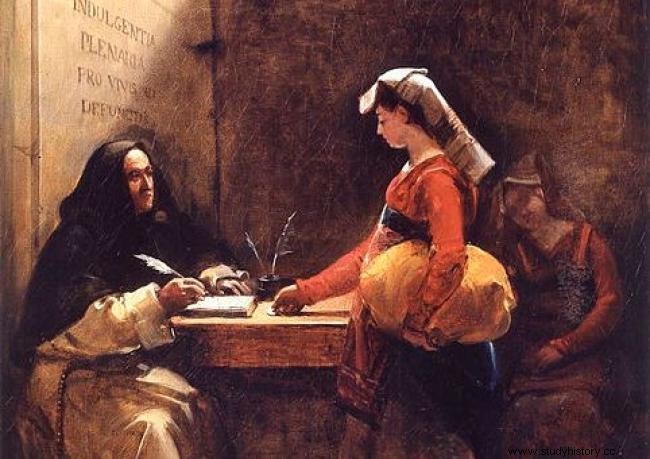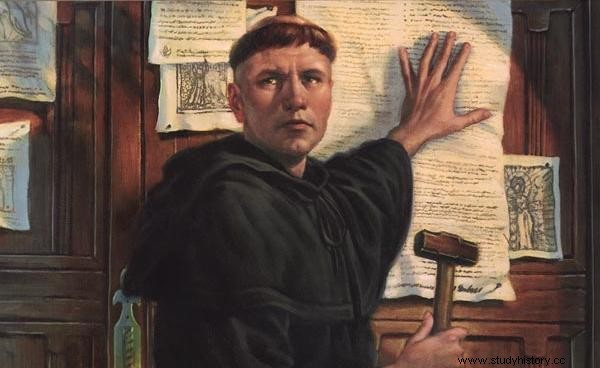According to the RAE, the indulgences they are the remission before God of the temporal punishment corresponding to sins already forgiven, which is obtained through the mediation of the Church, and according to the etymology it comes from the Latin indulgentia (benevolence, kindness or exemption from something, always from a superior to an inferior), name derived from the verb indulgeo (to be indulgent or to concede). Once the bases are established, let's get into the historical question.

The first antecedents of the practice of indulgences date back to the third century, when the penances imposed for sins considered especially serious were very severe. So, in order to recover the lost sheep, the duration and severity of the sentences imposed were gradually reduced, only to certain people recoverable for the cause and who, in exchange for that reduction, carried out certain actions (pilgrimage, mortification, fasting... ) or provision of services, such as the first plenary indulgence granted by Pope Urban II in the 11th century to those who participated in that First Crusade against the infidels. Thousands and thousands of Christians of all classes and conditions took the cross to the cry of...
God wants it.
From the twelfth century, the practice of indulgences began to spread throughout the Church and, incidentally, to pervert its spirit until it became a real market to obtain financing and buyers the forgiveness of their sins. But Sixtus IV went a little further...
Those who died in the light of Christ's charity can be helped by the prayers of the living. And not only that. If alms are given for the needs of the Church, souls will gain God's indulgence.
To date, the beneficiaries of the indulgences were the living, but now the living could buy a ticket on a luxury cruise so that their deceased could leave the terrifying purgatory, where sorrows were redeemed, and reach the heavenly paradise. Another advantage of this market, unlike other Popes who sold relics more false than Judas or obtained from looting tombs of saints, was that by not giving anything in return it was an inexhaustible product. A legion of priests toured cities and towns selling smoke that the fearful of God bought for the benefit of their deceased...
passports to take the soul to Paradise
In 1517, the Dominican Johannes Tetzel was touring Germany as a traveling salesman, raising funds for Pope Leo X by selling indulgences. They could be bought in two types:a posteriori , which freed the soul of a loved one from purgatory and a priori , for future sins you might commit. Faced with this immorality, on October 31, 1517 Luther nailed his 95 theses to the door of the Wittenberg Palace Church attacking the mercantilism of the salvation of souls. In addition, using the latest technology, the printing press, he managed to make his thesis known throughout Europe in just two months. Although at first Leo X did not pay much attention to that crazy loner, the good reception he had, especially in central and northern Europe, forced him to take action on the matter before he broke the business. In 1521 he published the bull Decet Romanum Pontficem in which he excommunicated Luther . Far from putting a stop to the conflict, Luther's theses served to propose a reform of the Church from several European countries. From this movement would be born the so-called Protestant Reformation that would lead to the schism of the Catholic Church, the origin of Protestantism (mainly Lutheranism and Calvinism).

But there was also some buyer who left the indulgence seller composed and without… money. The Count of Villamediana, Juan de Tassis , listened attentively to a homily in which the parish priest focused on the theme of the souls wandering in purgatory and how they could be freed from that suffering:a donation would provide them with their trip to heaven where they would already be happy as partridges in spring . When the Eucharist was over, the count approached the sacristy and placed a gold coin on the priest's table. This one, surprised by his reputation for being stingy, told him...
Your Excellency, you have just taken a soul out of purgatory.
Father, can the souls that come out of purgatory come back for some reason? the count asked him.
The priest told him that once in heaven it was no longer possible to return to purgatory. The count took the coin that was still on the table and said…
Well, that being the case, you won't need this coin anymore.
